Best B2B CRM Software: Boost Your Business Growth in 2025

As a B2B business, are you tired of jumping through hoops to close sales? Do you pour time and money into generating promising leads, only to have them go into a black hole of unread emails and never-ending follow-ups? Does your sales process feel scattered and disjointed, with poor communication between teams?
Well, You’re not the only one feeling this frustration.
Many B2B organizations struggle to manage their lengthy sales cycles because they lack the tools to effectively track leads and opportunities. Without visibility into your pipeline, sales reps work blindly, marketing assets are wasted, and deals stall without reason.
Your well-earned leads shouldn’t disappear into a void. Take control of your sales process with a solution tailored for B2B success. With the right systems in place, you can optimize workflows, monitor your pipeline’s health, and maximize conversion rates. In this blog, we’ll look at the main competitors in the industry, each claiming for the title of Best B2B CRM System.
B2B CRM Software: What is it?
Before we dive into the contenders, let’s take a quick look at what B2B CRM software is all about. CRM software, also known as Customer Relationship Management software, is a technological solution that helps businesses in managing their relationships with customers, clients, and partners. B2B CRM stands for Business-to-Business Customer Relationship Management.
It refers to the technologies and strategies used by companies to manage their relationships and interactions with other businesses. This includes storing customer data from different sources (e.g. website,web form, email, social media, meetings, chats, etc.) tracking sales interactions, automating marketing, and analyzing data to understand and better serve their business customers. The goal of B2B CRM is to find, attract, and retain business customers and clients to grow the company’s bottom line.
Read Also: Best CRM for Real Estate
Key differences between B2B CRM Software and B2C CRM Software:
| Feature | B2B CRM Software | B2C CRM Software |
| Customers | Businesses and organizations | Individual consumers |
| Sales Cycle | Long and complex, with multiple decision-makers | Short and impulsive, often driven by emotions |
| Deal Size | Typically larger and more complex | Smaller and easier to manage |
| Relationships | Focuses on building long-term, strategic partnerships | Focuses on individual transactions and short-term satisfaction |
| Features | Advanced lead scoring, opportunity management, complex pipeline tracking, quoting and proposal tools | User-friendly shopping cart integration, customer loyalty programs, personalized recommendations |
| Data | Focuses on detailed company information, contact roles, and purchase history | Focuses on individual customer preferences, purchase history, and browsing behavior |
| Marketing | Targeted campaigns, nurturing leads through multiple channels | Broad campaigns, quick conversions, leveraging social media |
| Training | More complex, requires understanding of sales processes and CRM features | Simpler, focuses on basic purchase workflows and product use |
| Cost | Typically higher due to advanced features and larger data volume | Can be less expensive due to simpler features and smaller data volume |
B2B CRM Software: Key Features?
To be considered the best B2B CRM software provider in 2025, a platform should offer a range of essential features, including:
Contact and Account Management: B2B CRM software allows you to keep specific information about your client base, such as contact information, company profiles, and previous contacts. This helps in the maintenance of an extensive database of your company ties.
Sales & Lead Management: CRM software assists in the tracking of sales leads, opportunities, and the full sales process. It enables sales teams to organize and prioritize leads, forecast sales, and collaborate on deals.
Opportunity Tracking: B2B CRM solutions allow you to track and manage prospects or deals as they progress through the sales cycle, from initial contact to deal closure.
Pipeline Management: You can visualize and manage your sales pipeline, providing insights into potential revenue and assisting sales teams in focusing on high-priority projects.
Task and Calendar Management: B2B CRM solutions include features for scheduling tasks, appointments, and follow-ups, allowing you to keep organized and on top of customer interactions.
Analytics and Reporting: B2B CRM software includes reporting and analytics tools that will help you analyze sales performance, customer interactions, and other relevant information in order to make data-driven decisions.
Customization: B2B CRM software can be customized to meet your individual business operations and requirements. Creating custom fields, workflows, and automation rules are all part of this.
B2B CRM Software: Why is it important for B2B companies?

Managing customer Information: CRM software enables B2B businesses to centralize and organize customer data, such as contact information, communication history, purchase history, and other relevant information. This allows sales and marketing teams to better understand their consumers and prospects and adjust their interactions and products.
Marketing Campaign Management: B2B businesses frequently run marketing campaigns to reach out to potential customers. CRM software can help in the planning, execution, and analysis of these campaigns by tracking leads, measuring conversions, and calculating ROI.
Collaboration and Communication: CRM software often includes team collaboration and communication functions. This enables employees from several departments to share information and collaborate to deliver a more uniform and smooth customer experience.
Customer Retention and Upselling: B2B organizations can improve customer retention and uncover possibilities for upselling or cross-selling additional products or services by understanding their customers’ requirements and preferences.
Integration with Other Systems: Many CRM solutions include the ability to integrate with other software, including as email marketing tools, accounting software, and e-commerce platforms. This integration improves productivity by streamlining business processes and reducing human data entry.
Customer Support and Service: Several B2B companies offer their customers ongoing support and services. CRM systems aid in the management of customer service requests, the tracking of service history, and the provision of fast responses, all of which can improve customer satisfaction and retention.
Read Also: Benefits of CRM
| B2B CRM Statistics | Data |
| CRM Impact on Sales Revenue | According to a Nucleus Research report, CRM applications can deliver an average return of $8.71 for every dollar spent, showcasing a substantial impact on sales revenue. |
| B2B Companies Adopting CRM | A survey by Capterra found that approximately 75% of B2B companies use a CRM system to manage and optimize their customer interactions and sales processes |
| CRM and Customer Retention | Harvard Business Review suggests that increasing customer retention rates by just 5% can result in profit increases ranging from 25% to 95%, underlining the role of CRM in customer retention. |
| CRM Adoption in Small and Medium Enterprises (SMEs) | According to SMB Group, around 56% of small and medium-sized enterprises (SMEs) have adopted CRM solutions to streamline their sales and customer management processes. |
| Impact of CRM on Sales Productivity | Sales teams that use CRM tools can experience a 15% increase in productivity, as reported by Salesforce, highlighting the efficiency gains associated with CRM adoption. |
| CRM and Improved Customer Experience | A study by SuperOffice indicates that businesses that prioritize customer experience through CRM see, on average, a 10-15% increase in revenue and a 20% increase in customer satisfaction. |
Now, let’s explore the B2B CRM software providers of 2025.
SaleTown: B2B CRM Software for Small Businesses
Overview: SaleTown CRM is a revolutionary B2B CRM software that aims to improve businesses’ sales and customer relationship management processes. It focuses on lead management, pipeline tracking, and analytics tools.
Key Features:
- Automated Lead Capture: Automatically imports leads from various sources such as websites, social media, and Ads campaigns, ensuring no lead is missed.
- Lead and Contact Management: Efficiently organize and track all leads and contacts in one place, ensuring seamless follow-up and conversion.
- Sales Pipeline and Opportunity Tracking: Visualize and manage your sales pipeline to track the progress of deals from lead to close.
- Custom Columns: Create custom fields and columns to tailor the CRM to specific business needs and workflows.
- In-built Email Marketing Feature: Create and send email marketing campaigns, track responses, and maintain effective communication with clients with SalesTown CRM.
- Customizable Reports and Dashboards: Generate custom reports and dashboards to gain insights into sales performance, lead sources, and other key metrics.
- Integration Options: Connect with various third-party apps and services to enhance functionality and streamline workflows.
Take the Next Step: Book Your Free CRM Demo
Pros:
- Affordable pricing plans, including a free version.
- User-friendly interface suitable for small businesses.
- Effective lead and pipeline management tools.
- Good customization options for reports and dashboards.
Cons:
- Limited advanced automation features.
- Smaller user community compared to larger CRMs.
HubSpot: Best B2B CRM for Inbound Marketing and Sales
Overview: Offers an easy-to-use B2B CRM platform focused on inbound marketing and sales. It’s a popular choice for small to medium-sized businesses looking for an easy-to-use, integrated solution.
Key Features:
- Contact and Lead Management: Track interactions and maintain detailed records of contacts and leads to personalize and improve communication.
- Email Tracking and Automation: Automate email campaigns, track open rates, and receive notifications when leads engage with emails.
- Marketing Automation: Automate repetitive marketing tasks and workflows, from lead nurturing to social media posting.
- Sales Analytics and Reporting: Access detailed sales reports and analytics to monitor performance and make data-driven decisions.
- Integrations: Seamlessly integrate with HubSpot’s other marketing and sales tools, as well as a wide range of third-party applications.
Pros:
- Free version available with robust features.
- Excellent for inbound marketing and sales integration.
- Easy to use and set up.
- Comprehensive analytics and reporting tools.
Cons:
- Paid plans can be expensive for small businesses.
- Some advanced features require additional paid add-ons.
- Limited customization options in the free version.
Zoho CRM: Affordable B2B CRM Software for Small and Medium Businesses
Overview: Zoho CRM is an affordable, feature-rich B2B CRM system that is appropriate for organizations of all sizes. It offers a wide range of solutions for streamlining sales, marketing, and customer service activities.
Key Features:
- Sales Automation and Workflow Management: Automate sales processes and workflows to improve efficiency and consistency.
- Email Marketing and Social Media Integration: Manage email campaigns and social media interactions directly from the CRM.
- Advanced Analytics and Reporting: Generate detailed reports and analytics to gain insights into sales performance and customer behavior.
- Mobile CRM Capabilities: Access CRM data and perform tasks on the go with robust mobile applications.
- Integration with Other Zoho Applications: Connect seamlessly with other Zoho apps, such as Zoho Books and Zoho Projects, for a unified business solution.
Pros:
- Affordable pricing plans.
- Rich feature set, even in the free version.
- Strong integration with other Zoho products.
- Good mobile CRM capabilities.
Cons:
- Interface can be overwhelming for new users.
- Some advanced features are only available in higher-tier plans.
- Customer support can be slow.
Salesforce: Leading B2B CRM Software for Enterprise-Level Businesses
Overview: Salesforce is the broad CRM market leader, offering a wide range of solutions for B2B companies. It’s known for its flexibility and scalability, catering to businesses of all sizes.
Key Features:
- Lead and Opportunity Management: Track and manage leads and opportunities through the entire sales cycle.
- Sales Forecasting: Predict sales revenue and trends to inform strategy and planning.
- Customer Support: Provide exceptional customer service with case management and support tools.
- Marketing Automation: Automate marketing campaigns and workflows to reach and engage prospects effectively.
- Robust Reporting and Analytics: Access comprehensive reports and analytics to monitor performance and make data-driven decisions.
Pros:
- Highly customizable and scalable.
- Comprehensive feature set for sales, marketing, and customer support.
- Strong ecosystem with numerous integrations and add-ons.
- Excellent reporting and analytics capabilities.
Cons:
- Expensive, especially for small businesses.
- Steep learning curve for new users.
- Customization can be complex and time-consuming.
Microsoft Dynamics 365: B2B CRM Software for Microsoft-Centric Businesses
Overview: Microsoft’s CRM offering, Dynamics 365, offers B2B organizations a comprehensive range of business applications, including CRM and ERP.
Key Features:
- Sales Force Automation: Automate sales tasks and processes to enhance productivity and efficiency.
- Marketing Automation: Manage marketing campaigns, lead nurturing, and customer engagement from a single platform.
- Customer Service: Deliver personalized customer service with case management and knowledge base tools.
- Analytics: Utilize powerful analytics and reporting tools to gain insights and drive business growth.
- Seamless Integration with Microsoft Products: Integrate seamlessly with other Microsoft products like Office 365 for a unified experience.
Pros:
- Strong integration with Microsoft ecosystem.
- Comprehensive feature set for sales, marketing, and customer service.
- Scalable and flexible to meet enterprise needs.
- Robust analytics and reporting tools.
Cons:
- Higher cost compared to some other CRMs.
- Complex setup and customization process.
- Learning curve for new users, especially those not familiar with Microsoft products.
Pipedrive: Best B2B CRM for Sales Pipeline Management
Overview: Pipedrive is a sales-focused CRM that helps businesses manage leads and deals effectively, making it an excellent choice for B2B companies looking to optimize their sales processes.

Key Features:
- Visual Sales Pipeline: Provides a visual representation of the sales pipeline, allowing users to easily track and manage deals.
- Activity and Goal Tracking: Set goals and track activities to ensure consistent progress towards sales targets.
- Email Integration: Integrate with email providers to manage email communications and track interactions directly from the CRM.
- Customizable Reports: Generate customizable reports to analyze sales performance and identify areas for improvement.
- Mobile App: Access CRM data and manage tasks on the go with a robust mobile application.
Pros:
- Intuitive and easy-to-use interface.
- Strong focus on sales pipeline management.
- Affordable pricing plans.
- Excellent mobile app.
Cons:
- Limited advanced features compared to more comprehensive CRMs.
- Customization options can be limited.
- Basic reporting features in lower-tier plans.
Freshsales: Best B2B CRM for Customer Engagement
Overview: Freshsales, part of the Freshworks suite, is a CRM designed to enhance customer engagement and streamline sales processes for B2B companies.
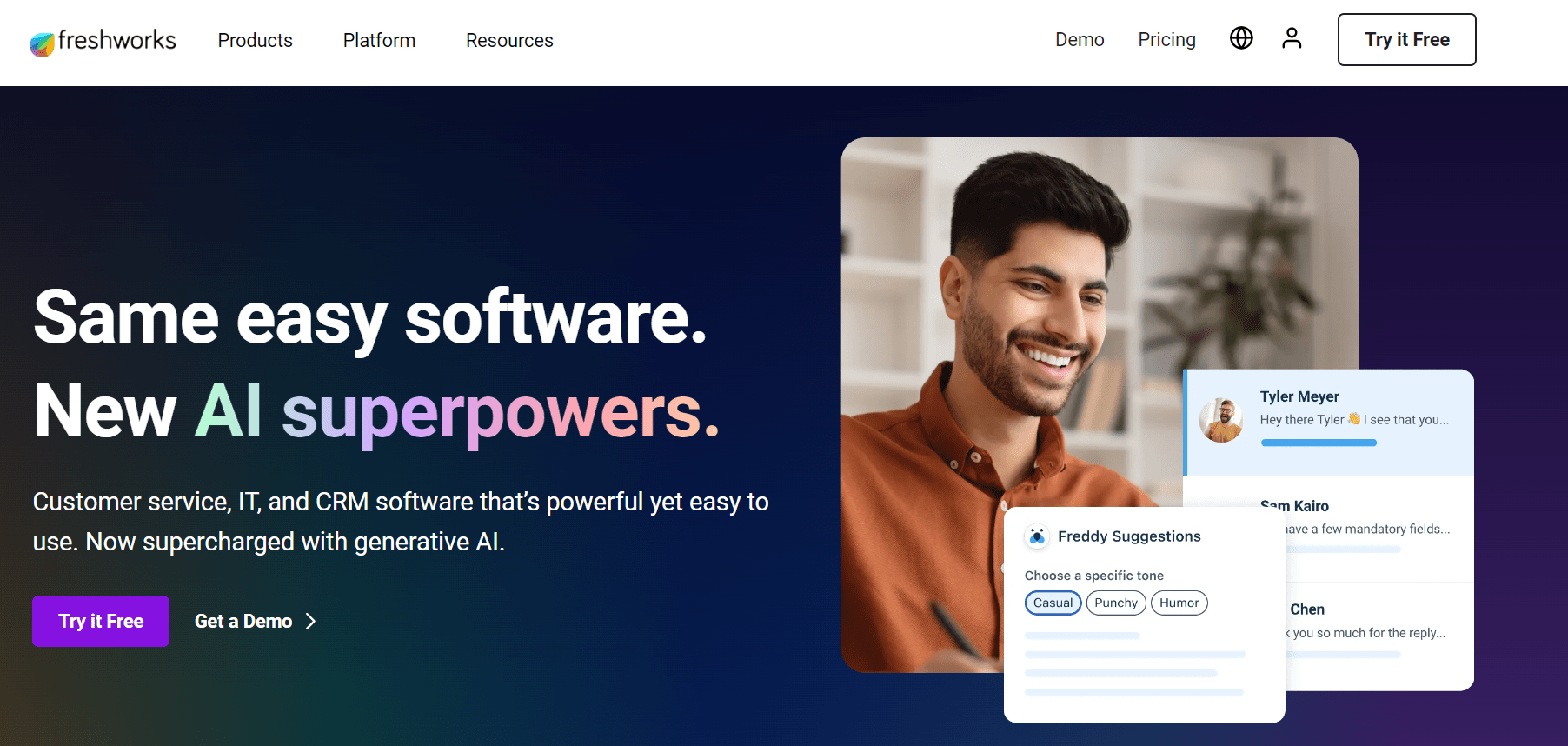
Key Features:
- AI-Powered Lead Scoring: Utilize AI to score leads based on engagement and likelihood to convert.
- Sales Sequences: Create and automate personalized sales sequences to nurture leads and close deals.
- Email and Phone Integration: Manage email and phone communications directly from the CRM, with call logging and email tracking.
- Deal Management: Track and manage deals through customizable sales pipelines.
- Reports and Analytics: Access detailed reports and analytics to gain insights into sales performance and customer behavior.
Pros:
- AI-powered lead scoring enhances lead prioritization.
- Strong email and phone integration.
- Affordable pricing with a free version.
- User-friendly interface.
Cons:
- Limited customization options in lower-tier plans.
- Advanced features require higher-tier plans.
- Customer support can be slow at times.
Nimble: Best B2B CRM for Social Media Integration
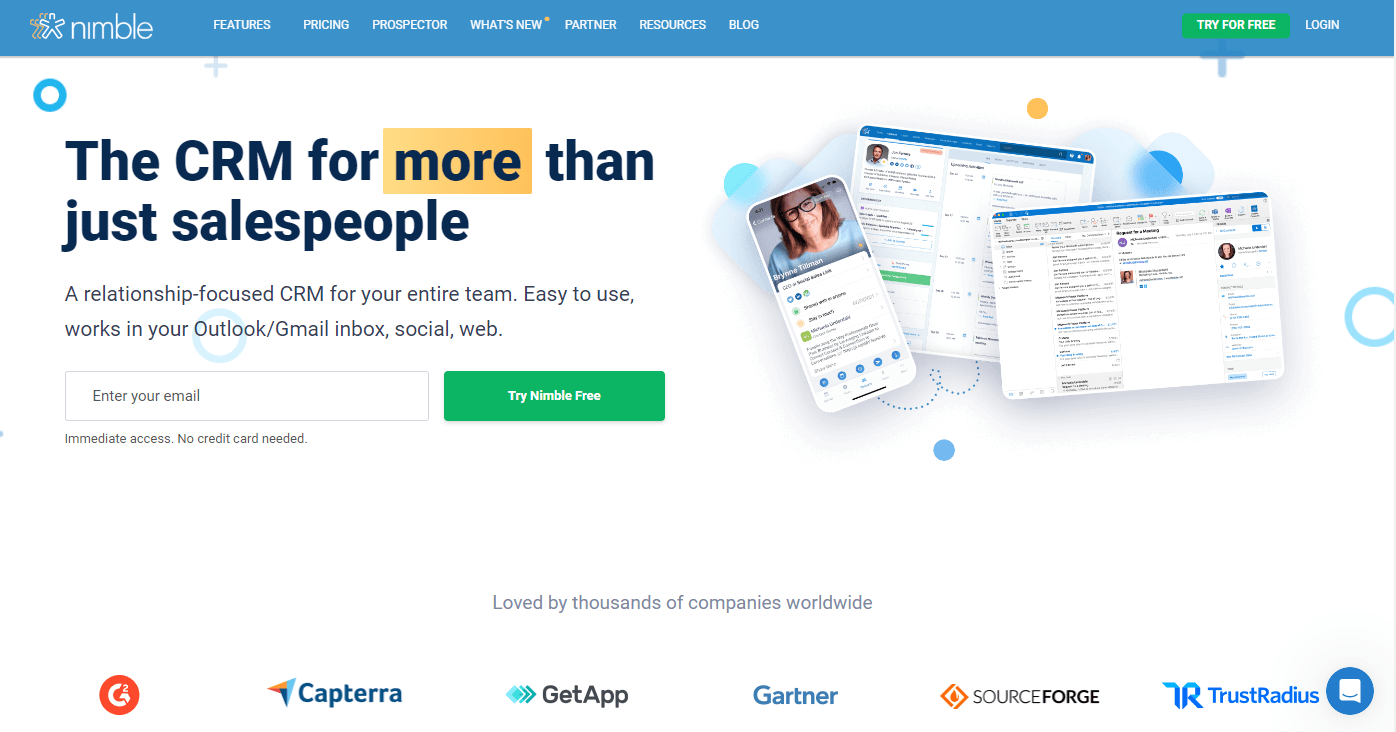
Overview: Nimble is a CRM that emphasizes social media integration and relationship building, making it ideal for B2B companies looking to enhance their social selling efforts.
Key Features:
- Social Media Integration: Integrate with social media platforms to track and engage with prospects and customers.
- Contact Management: Maintain detailed contact profiles, including social media interactions and communication history.
- Pipeline Management: Track deals through a visual pipeline to manage sales processes effectively.
- Activity Tracking: Log and track activities, tasks, and communications to stay organized and productive.
- Reporting and Analytics: Generate reports and analytics to monitor sales performance and customer engagement.
Pros:
- Excellent social media integration.
- Affordable pricing.
- User-friendly interface.
- Strong contact management features.
Cons:
- Limited advanced features compared to more comprehensive CRMs.
- Basic reporting features.
- Integration options are not as extensive as some competitors.
Insightly: Best B2B CRM for Project Management Integration
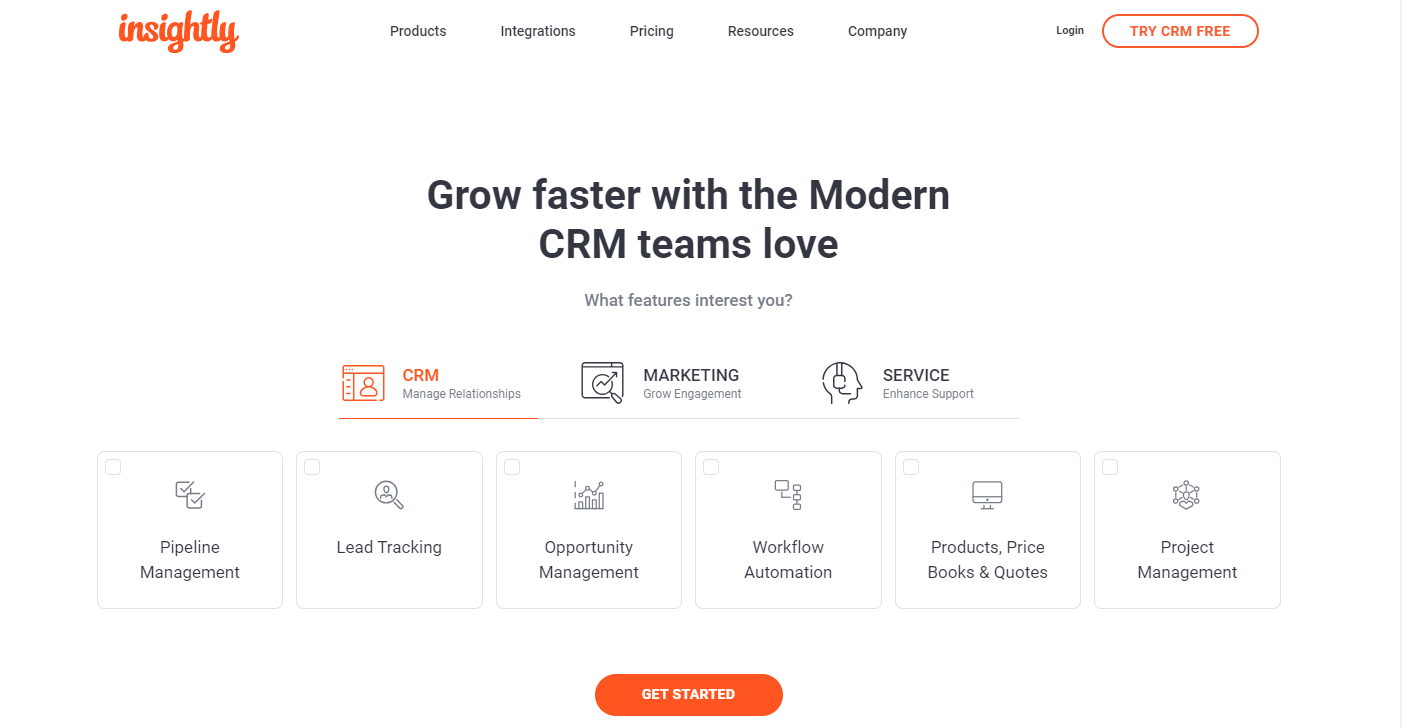
Overview: Insightly combines CRM With project management Features, making it a great choice for B2B companies that need to manage customer relationships and projects in one platform.
Key Features:
- Contact and Lead Management: Track and manage contacts and leads through the entire sales cycle.
- Project Management: Plan and manage projects directly within the CRM, ensuring seamless collaboration and execution.
- Email Tracking and Automation: Automate email campaigns and track engagement to improve communication and follow-up.
- Custom Dashboards and Reports: Create custom dashboards and reports to gain insights into sales performance and project status.
- Integration with Third-Party Apps: Connect with various third-party applications to extend functionality and streamline workflows.
Pros:
- Strong project management integration.
- User-friendly interface.
- Comprehensive email tracking and automation tools.
- Good customization options for reports and dashboards.
Cons:
- Higher cost compared to some other CRMs.
- Limited advanced features in lower-tier plans.
- Customer support can be slow.
Copper: Best B2B CRM for Google Workspace Integration

Overview: Copper is a CRM designed to work seamlessly with Google Workspace (formerly G Suite), making it ideal for B2B companies that rely on Google’s productivity tools.
Key Features:
- Google Workspace Integration: Seamlessly integrate with Google Workspace apps like Gmail, Calendar, and Drive for a unified experience.
- Contact and Lead Management: Track and manage contacts and leads with detailed profiles and interaction history.
- Pipeline Management: Visualize and manage sales pipelines to track deal progress and forecast revenue.
- Task and Activity Management: Manage tasks and activities with reminders and notifications to stay organized and productive.
- Reporting and Analytics: Generate detailed reports and analytics to gain insights into sales performance and customer engagement.
Pros:
- Excellent integration with Google Workspace.
- User-friendly interface.
- Strong contact and lead management features.
- Good reporting and analytics tools.
Cons:
- Higher cost compared to some other CRMs.
- Limited customization options.
- Advanced features require higher-tier plans.
Bitrix24: Comprehensive B2B CRM with Collaboration Tools
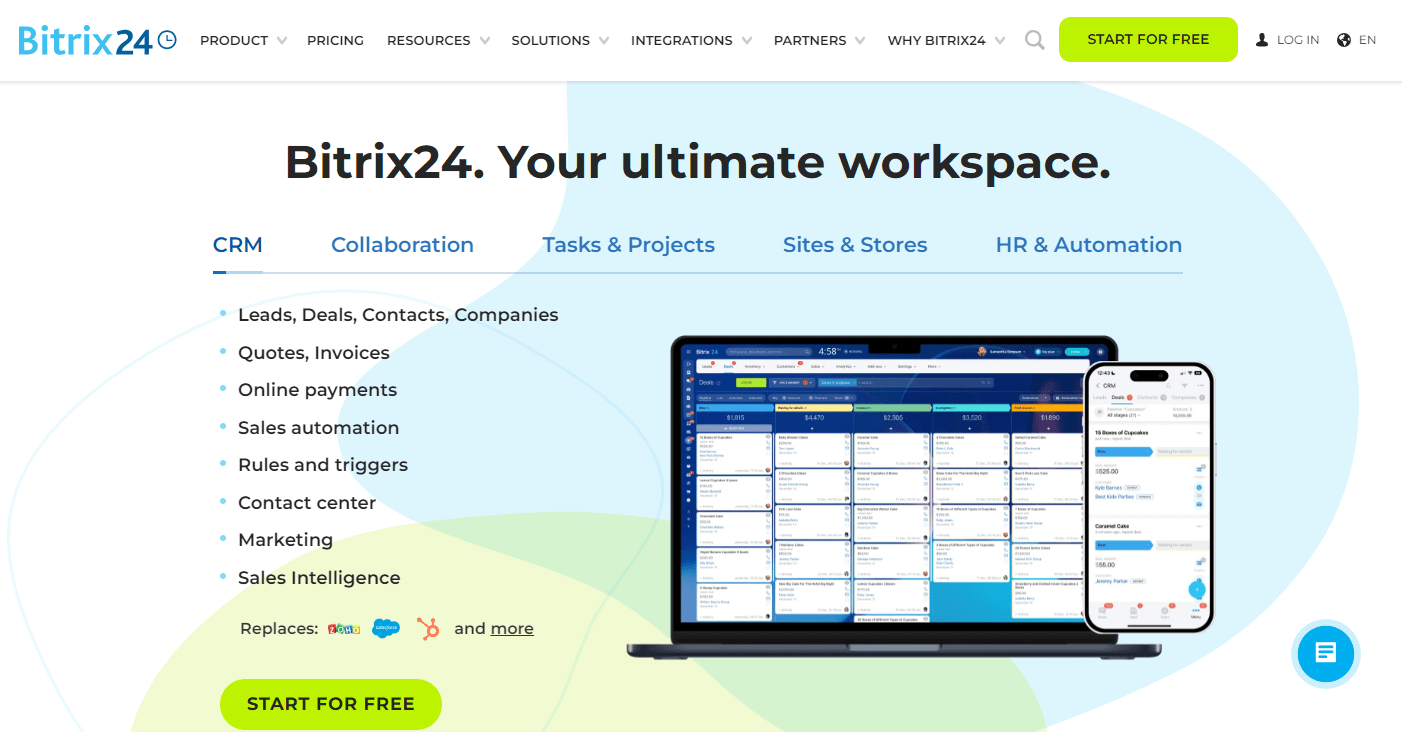
Overview: Bitrix24 is a versatile B2B CRM that combines customer relationship management with project management and team collaboration features.
Key Features:
- Contact and lead management
- Sales pipeline and opportunity tracking
- Task and project management tools
- Built-in communication channels (chat, video calls)
- Time tracking and employee management
- Website builder and landing pages
Pros:
- Extensive feature set beyond traditional CRM
- Free plan available with generous features
- Strong collaboration and project management tools
- Good value for money
Cons:
- Interface can be overwhelming due to numerous features
- Steeper learning curve for new users
- Some users report occasional performance issues
Keap (formerly Infusionsoft): B2B CRM for Marketing Automation
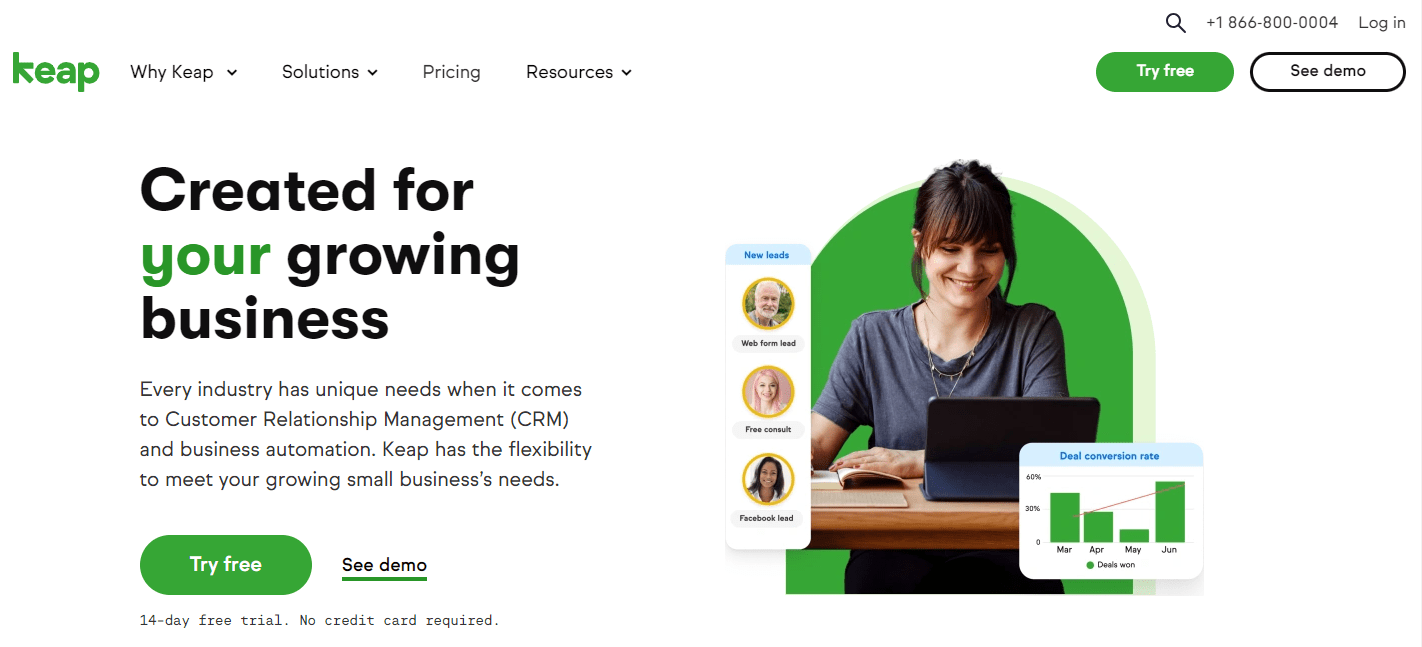
Overview: Keap is a B2B CRM that specializes in marketing automation, making it suitable for small to medium-sized businesses focused on growth.
Key Features:
- Contact management and segmentation
- Advanced marketing automation workflows
- Email marketing and campaign builder
- Sales pipeline management
- Invoicing and payment processing
- Landing page and form builders
Pros:
- Powerful marketing automation capabilities
- All-in-one solution for sales, marketing, and payments
- Good email marketing features
- Customizable campaign builder
Cons:
- Can be expensive for small businesses
- Steep learning curve due to complex features
- Some users find the interface outdated
What Makes the Best B2B CRM Software?
Needs differ from business to business, but here are a few of the most significant features to look for in a B2B CRM:
- Customization and Flexibility: B2B companies frequently have their own processes and language. The greatest CRM systems are adaptable and can be tailored to a company’s specific workflows and requirements.
- Ease of Use: When a CRM is simple to understand and use, your team can gain more value from it faster.
- Scalability: A B2B CRM system should be flexible to handle an increasing number of accounts, contacts, and interactions as the B2B organization grows.
- Customer Support: Even with the most user-friendly CRM system, you will almost certainly require customer support at some point. Look for a CRM platform that provides helpful, professional customer service.
- Integration Capabilities: B2B companies often use many different tools, therefore it’s important that their CRM software can interact with the other tools and systems they use.
- User-Friendly Interface: Design simply to improve user experience and increase adoption.
How to choose CRM for your B2B company?
Contact Management: Easily store and organize customer information, including communication history.
Sales Pipeline Tracking: Monitor deals from lead to closure, helping forecast sales.
Task Management: Assign and track tasks for team members to keep everyone organized.
Email Integration: Connect with email platforms to streamline communication and keep records.
Reporting and Analytics: Generate insights on sales performance, customer behavior, and more.
Customizable Fields: Adapt the CRM to your specific business needs and data requirements.
Collaboration Tools: Allow team members to share information and work together effectively.
Mobile Access: Use the CRM on-the-go via smartphones or tablets.
When choosing, prioritize features that align with your company’s specific goals and processes. Remember, the best CRM is one that your team will actually use, so consider ease of use alongside functionality.
Why SalesTown CRM is the best CRM for B2B landscape
SalesTown CRM is tailored specifically for the unique challenges and workflows of businesses operating in the B2B landscape. Here’s how SalesTown CRM caters to the intricate needs of B2B companies:
Lead Capture and Centralized Organization: In the B2B world, leads often come from various sources, such as trade shows, referrals, and online forms. SalesTown CRM allows you to capture leads from multiple channels and consolidate them in a centralized database. All lead profiles, notes, activity history, and client data are organized in one place, providing a comprehensive view of your potential and existing B2B customers.
Automated Workflows: B2B sales cycles can be complex, involving multiple touchpoints and stakeholders. SalesTown enables you to automate critical workflows, such as lead distribution based on predefined criteria (e.g., Numbers, percentage, or round robin), creation of custom columns for B2B-specific data points (e.g., company size, industry, or decision-makers), and real-time sales notifications to keep your team informed about crucial updates.
Sales Pipeline Management: Effective pipeline management is essential in the B2B landscape, where deals can take months or even years to close. SalesTown CRM allows you to define customized pipeline stages that align with your B2B sales process. You can set stage change conditions, assign stage followers to other sales reps for collaboration, and configure stage change due reminders to ensure timely progression of opportunities.
Timely Follow-ups: In the B2B world, timely follow-ups are critical for building trust and nurturing long-term relationships. SalesTown CRM ensures that your sales team never misses a beat by sending stage change due notifications via SMS, email, and WhatsApp, enabling them to follow up with prospects and customers at the right time.
IVR Solution: B2B businesses often rely on inbound and outbound calls for lead generation and customer engagement. SalesTown CRM with IVR solution, allowing you to capture leads effectively through phone interactions and streamline the lead generation process.
Email Marketing: SalesTown’s built-in email marketing capabilities allow you to craft personalized campaigns, nurture leads with targeted content, and maintain consistent communication throughout the sales cycle, ensuring that your B2B prospects and customers remain engaged.
Accurate Reporting and Analytics: Data-driven decision-making is crucial for optimizing sales strategies and maximizing revenue. SalesTown provides powerful reporting and analytics tools that offer insights into your B2B sales performance, allowing you to identify trends, uncover opportunities, and make informed decisions to drive growth.
With its B2B-centric features, automated workflows, and robust analytics capabilities, SalesTown CRM empowers businesses to navigate the complexities of the B2B landscape, nurture long-lasting relationships with customers, and achieve sustainable growth in this competitive arena.
Conclusion
Having a good system to manage customer relationships (CRM) is super important in today’s B2B world, especially in 2025! The right CRM can make a huge difference in your business.
SalesTown CRM is a game-changer that can help your B2B company run smoother, sell more, and keep your customers happy. Here’s how:
- Streamline operations: SalesTown helps you organize everything in one place, saving you time and effort.
- Increase sales: With better lead tracking and sales tools, you’ll close more deals.
- Happy customers: SalesTown helps you stay on top of customer needs, leading to satisfied clients.
If you’re looking for a powerful and easy-to-use CRM for your B2B business, then SalesTown CRM is the perfect solution!
Get a Free Demo
Frequently Asked Questions ( Faqs )
Q. Who is the Best b2b CRM Software provider?
SalesTown stands out as a #No. 1 b2b CRM Software provider, recognized for its innovative solutions that seamlessly integrate AI and automation, empowering businesses to enhance customer relationships and drive sales growth.
Q. What features should I look for in Best B2B CRM software?
Contact management, lead tracking, opportunity management, pipeline management, integration capabilities, reporting and analytics, and mobile accessibility are all desirable characteristics.
Q. How does B2B CRM differ from B2C CRM?
While both B2B and B2C CRMs share common features, B2B CRM typically focuses on longer sales cycles, account-based selling, and complex relationship management. B2C CRM, on the other hand, is often more transactional and focuses on individual consumer interactions.
Q. Why SalesTown over Salesforce?
SalesTown is better than Salesforce for sales and marketing, as well as being one of the best CRMs for small businesses, thanks to its robust free plan. in addition, it provides additional avenues for client communication.
